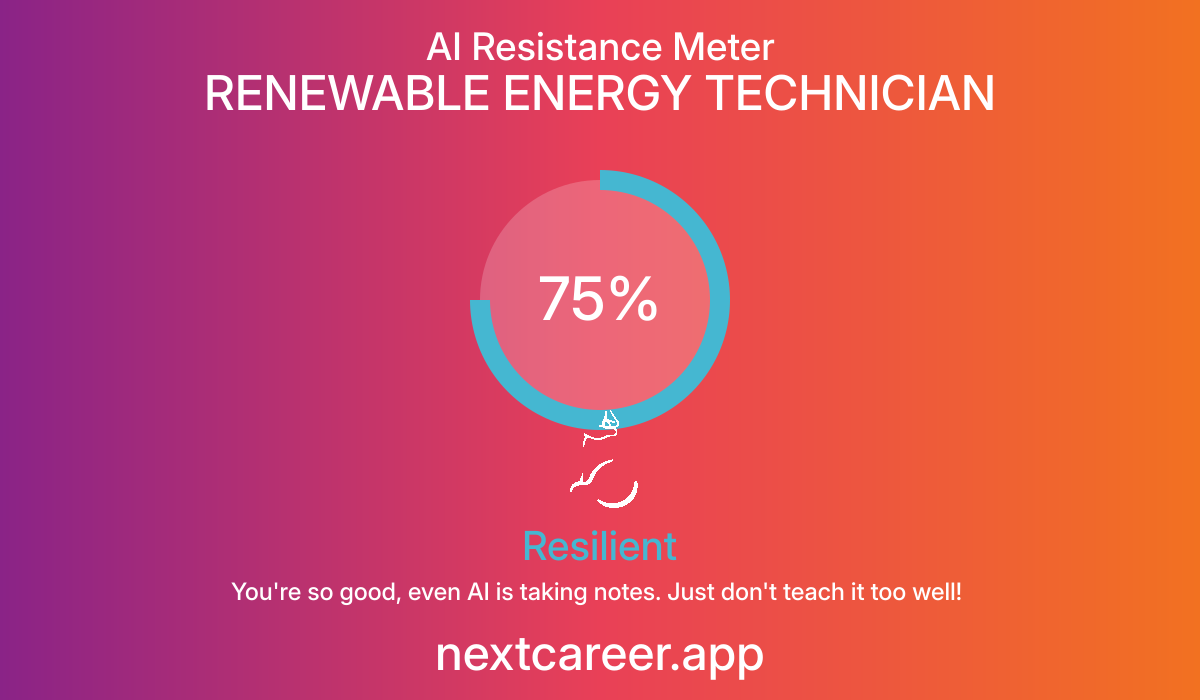AI Resistance Analysis
RENEWABLE ENERGY TECHNICIAN
RENEWABLE ENERGY TECHNICIAN
AI Resistance Score
AI Resistance Meter
Resilient
RENEWABLE ENERGY TECHNICIAN
You're so good, even AI is taking notes. Just don't teach it too well!
Renewable Energy Technicians are involved in the installation, maintenance, and repair of energy systems such as solar panels, wind turbines, and other renewable energy sources. These roles require a combination of physical skills, technical knowledge, and problem-solving abilities. The increasing complexity of energy systems will require ongoing human oversight and decision-making capabilities even as AI plays a larger role in monitoring and optimization.
Renewable Energy Technicians are involved in the installation, maintenance, and repair of energy systems such as solar panels, wind turbines, and other renewable energy sources. These roles require a combination of physical skills, technical knowledge, and problem-solving abilities. The increasing complexity of energy systems will require ongoing human oversight and decision-making capabilities even as AI plays a larger role in monitoring and optimization.
Key Factors
- Cognitive Tasks: While many traditional cognitive tasks related to system analysis can be automated, technicians will continue to require critical thinking to troubleshoot and innovate in complex scenarios.
- Emotional Intelligence: The need for interpersonal communication, customer service, and teamwork in various installations and repairs creates a strong reliance on human emotional intelligence.
- Physical Skills: Installation and manual repair work requires hands-on physical skills that are not easily replicable by robots, particularly in diverse or hazardous environments.
- Creative Thinking: The ability to devise creative solutions for unique site-specific challenges is essential, reflecting an aspect of human ingenuity that AI will struggle to fully replicate.
Human Advantages
- Humans can adapt to rapidly changing conditions on-site that AI may not interpret effectively.
- The ability to interact with clients and understand their specific needs is a human-centric capability.
AI Vulnerabilities
- AI can potentially automate basic monitoring tasks, data analysis, and predictive maintenance planning.
- Advanced robots may be able to perform certain physical installation tasks in controlled environments.
Recommended Actions
- Invest in ongoing training and skills development focused on advanced technologies and software used in renewable energy.
- Strengthen interpersonal and communication skills to enhance customer relations and teamwork capabilities.
- Foster adaptability and problem-solving skills to prepare for shifts in technology and job functions as AI evolves.
- Engage in interdisciplinary collaborations to understand the implications of AI and emerging technologies in renewable energy.
In the near term, AI will enhance the efficiency of renewable energy systems but will not replace technicians. Over the next 20+ years, as technologies evolve, technicians may transition toward roles focusing more on complex troubleshooting, strategic planning, and systems integration, alongside AI. Continuous learning and adaptation will be critical as the job may involve new roles in overseeing AI-driven systems and working collaboratively with autonomous technologies.

Why Calculate AI Resistance?
Understanding how AI-resistant your career is becoming increasingly important in today's rapidly evolving job market. Our analysis combines multiple factors including required human skills, technological adaptability, and future industry projections to give you a comprehensive view of your career's sustainability.